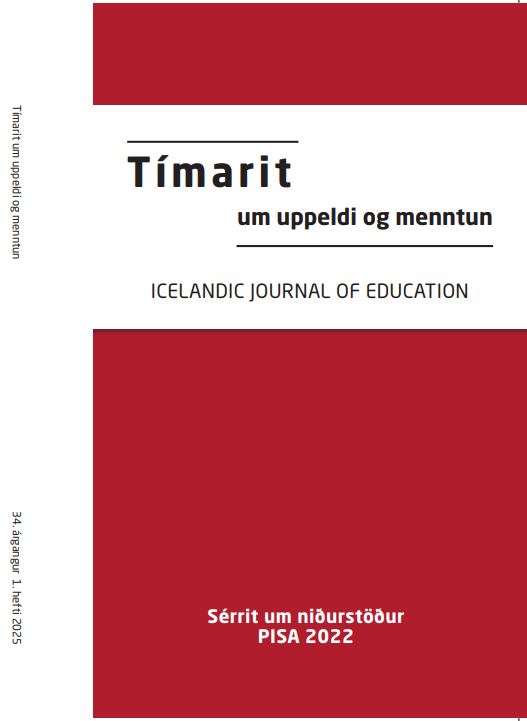Mathematics self-efficacy, mathematics anxiety, and teacher support: predictors of Icelandic students' performance in PISA 2022
DOI:
https://doi.org/10.24270/tuuom.2025.34.3Keywords:
self-efficacy, mathematics literacy, mathematics anxiety, teacher support, PISA 2022Abstract
Mathematics education in Iceland has faced increasing challenges in recent years, as evidenced by the declining performance of Icelandic students in the Programme for International Student Assessment (PISA). The 2022 results revealed a significant drop in mathematical literacy scores, placing Iceland below the OECD average (OECD, 2023a). This study examines the role of self-efficacy in mathematics, mathematics anxiety, and teacher support in shaping Icelandic students’ performance in PISA 2022.
Bandura (1997) defines self-efficacy as an individual’s belief in their capacity to organize and execute the actions required to manage prospective situations. In the domain of mathematics, self-efficacy has been linked to higher motivation, persistence, and overall achievement (Schunk & Pajares, 2009). Self-efficacy is often operationalized within a specific domain, such as mathematics self-efficacy. In research, mathematics self-efficacy is commonly measured with several questions assessing how well students feel equipped to tackle specific tasks, such as solving the equation 3x + 5 = 17 or using a timetable to determine travel time between two locations.
Research has shown that students with high self-efficacy in mathematics tend to engage more actively in problem-solving and achieve better academic outcomes (Pajares & Kranzler, 1995; Stankov & Lee, 2017). Conversely, students with low confidence in their mathematical abilities are more likely to experience frustration and disengagement, leading to poorer performance (Usher & Pajares, 2008).
Mathematics anxiety, defined as the emotional distress and apprehension associated with performing mathematical tasks (Richardson & Suinn, 1972), has been identified as a significant barrier to learning. High levels of mathematics anxiety impair cognitive processing by overloading working memory, thus reducing the efficiency of problem-solving (Ashcraft & Moore, 2009). Students with high mathematics anxiety tend to avoid mathematical activities, which in turn reduces their exposure to mathematical concepts and further weakens their competence (Dowker et al., 2016). Studies have found a consistent negative correlation between mathematics anxiety and performance, with meta-analyses indicating a medium to strong negative effect (Barroso et al., 2021). Furthermore, research suggests that self-efficacy and mathematics anxiety are inversely related, with students who have high self-efficacy experiencing lower levels of anxiety (Timmerman et al., 2017).
Studies on teacher support indicate that supportive teacher-student relationships are associated with increased student engagement and improved learning outcomes (Granziera et al., 2022; Tao et al., 2022). Teachers who provide clear explanations, encouragement, and constructive feedback can help build students’ confidence in their mathematical abilities (Mercer et al., 2011). However, the direct impact of teacher support on mathematics performance has been debated, as some research suggests that its effects are primarily indirect, mediated through increased motivation and engagement (OECD, 2023b; Yıldırım, 2012).
This study builds on data from PISA 2022, an international assessment measuring 15-year-old students’ proficiency in reading, mathematics, and science. In Iceland, all eligible students were invited to participate in the survey, allowing for a comprehensive analysis of the national student population. The study focuses on three key variables: self-efficacy in mathematics, mathematics anxiety, and teacher support, measured using standardized PISA survey scales. More detailed information about the survey scales in PISA 2022 can be found in Chapter 19 of the PISA 2022 Technical Report (OECD, 2024). Data analysis included correlation tests and multiple regression models to examine the relationships between self-efficacy, mathematics anxiety, teacher support, and mathematics performance in PISA 2022.
The findings confirm that self-efficacy is a strong predictor of mathematics performance among Icelandic students. Students with higher self-efficacy scores demonstrated significantly better results in the PISA mathematics assessment. The results also reveal a negative correlation between mathematics anxiety and performance, suggesting that higher levels of anxiety are associated with lower achievement. However, the effect size of mathematics anxiety was smaller than that of self-efficacy, indicating that confidence in one’s mathematical abilities is a more influential factor than anxiety in predicting academic success.
Interestingly, teacher support showed only a moderate correlation with mathematics performance. While there was a weak positive correlation between self-efficacy and teacher support, the direct impact of teacher support on performance was weaker than expected. This aligns with previous research suggesting that teacher support primarily influences learning through indirect pathways, such as fostering motivation, engagement, and self-efficacy (OECD, 2023a; Tao et al., 2022).
The findings underscore the importance of self-efficacy in mathematics achievement. Given its strong predictive value, educational strategies should focus on students’ confidence in their mathematical abilities. Furthermore, the role of mathematics anxiety should not be overlooked. While its impact on performance was weaker than that of self-efficacy, reducing mathematics anxiety could still lead to meaningful improvements in student engagement and achievement.
Downloads
Published
Issue
Section
License
Copyright (c) 2025 Berglind Gísladóttir, Jóhann Örn Sigurjónsson, Guðmundur Bjarki Þorgrímsson, Freyja Hreinsdóttir

This work is licensed under a Creative Commons Attribution 4.0 International License.

This work is licensed under a Creative Commons Attribution 4.0 International License.
